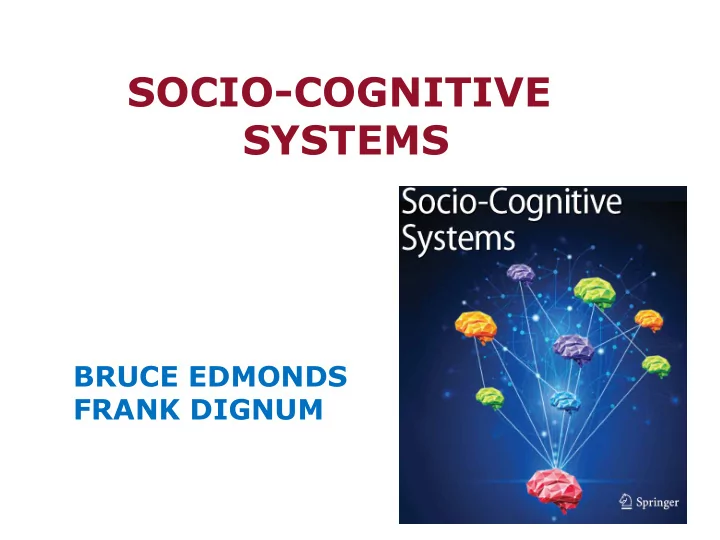

SOCIO-COGNITIVE SYSTEMS BRUCE EDMONDS FRANK DIGNUM
When What Who Title 8:00-8:30 registration 8:30-8:50 Introduction Frank Dignum 8:50-9:10 Introduction Bruce Edmonds Algorithmic Intervention Science: Towards AI decision aids for social 9:10-10:00 Invited Talk Milind Tambe work and public health 10:00-10:30 coffee break Tim Miller, Virginia Dignum Planning for Human-Agent 10:30-11:10 Paper and Frank Dignum collaboration using Social Practices Rijk Mercuur, John Bruntse Modelling the Social Practices of an Larsen and Virginia Emergency Room to Ensure Staff 11:10-11:50 Paper Dignum and Patient Wellbeing Antoni Perello-Moragues, Pablo Noriega, Julian Value-driven policy-making as a 11:50-12:30 Paper Padget and Harko socio-cognitive technical system Verhagen 12:30-14:00 lunch break Prashan Madumal, Tim Towards a Grounded Dialog Model Miller, Frank Vetere and 14:10-14:50 Paper for Explainable Artificial Intelligence Liz Sonenberg Stevan Tomic, Federico What normative framework for Pecora and Alessandro 14:50-15:30 Paper mixed human-robot societies? Saffiotti 15:30-16:00 coffee break Diogo Rato, Rui Prada and Cognitive Social Frames: The role of 16:00-16:40 Paper Samuel Mascarenha Social Context in agents cognition 16:40-17:30 Discussion
Agenda • Intelligent Social Behaviour • Norms, Social Practices,… • Socio-Cognitive Systems • Research directions?
A PERSON IS A PERSON THROUGH OTHER PERSONS
AI: from tool to partner
Sociality according to Social Science 1. Individualists (Weber, beginning 1900’s): individuals only, social arises from individual behaviors 2. Socialists (Durkheim, 1910’s): “natural” norms/roles determine individual behavior 3. Textualists (Habermas, 1960’s): conceptualization and language determine our social reality 4. Social Practice (Latour/Reckwitz, 1990’s): social reality is shaped by practices, the process is central Social Persons ( John Mbiti, 1975 ): 5. I am because we are, and since we are, therefore I am; Persons are shaped through their interactions with other persons
Sociality according to Agents Community Individualists : AAMAS, Game Theory Socialists : COIN, Social Simulation Culturalists : Agent Communication Social Practice : Social Simulation Social Persons: Socio-Cognitive Systems?
AI in a SOCIAL context • Optimal decision ➝ Accepted decision • Black box decision ➝ Explanable decision • One shot decision ➝ Repeated decisions • Action ➝ Interaction • Direct effect ➝ Long term social effect • … predict and adapt intelligently to social behaviour incorporate Social Reality in AI systems
Social structures and rules • Formal social structures: • Institutions, Organizations, Nations,… • Informal social structures: • Teams, Groups, Families, Friends,… Social rules are described in terms of: • Roles • Social Practices • Conventions • Norms • Values • Culture • …
The danger of computer science • Start with a technique • Explain a phenomenon in terms of that technique • It fits , • because everything is simplified until it fits! • Logic → Axioms, consistency,… • Game theory → Utility, strategy,… • Petri-Nets → Lifeness, deadlock,… • Bayesian Networks → Priors, influence, probability,… • Neural Networks → classification,… • Social simulations → emergence,… • Complex systems → networks, feedback loops,… • Linear programming → optimal solution,… • …
Attempt with socio-cognitive systems
Open issues: 1. Modularity and compositionality of social and cognitive models 2. Dynamicity of social reality
Add social modules to the AI system? Reality percept Social Social structures rules percept actions percept
Are the norms specified consistent and/or complete? • Assumption: Check consistency in norms module • Problem: connection with planning It is forbidden to be late for It is forbidden to cross a red a meeting light Late ➝ permit cross red Obliged to stop for red light lights When late and police present stop for red lights
State of the art Social and cognitive aspects of AI systems have to be developed in synchronization. Start of the Springer journal on Socio-Cognitive Systems Computational and formal approaches Editors in chief: F. Dignum and B. Edmonds (first issue: Jan. 2019)
Dynamics: Social structures motivate, emerge, adapt,… • Persons influence each other through social structures, using social structures and because of social structures groups, organizations, institutions, culture,… 16
Social deliberation Motives Personality Deliberation Functional interdependencies Social Values Planning Culture Norms 15 July 2018 17
Sketch of a social AI system Social structures Slow! Fast!
How to use theory on social intelligent behaviour? 1. During design of interactive systems 2. For designing socially intelligent systems 3. For designing social simulations 4. For designing MAS supported socio-technical systems
Designing applications in a social context Social practices Norms and values Social practices Norms Social status Motives Cardiomyopathy Child power 15 July 2018 20
Design socially intelligent systems Social practices Norms Roles 15 July 2018 21
Design of social simulations VALUES Explicit & Formal Concrete personal and social rules Explicit & What if? Formal Economical Ecological system system Social system 22 15 July 2018
Designing MAS supported socio-technical systems Sensor data Actions Self driving cars mix with Human driven cars Mixed simulation Social driver models 15 July 2018 23
Conclusions 1. Start of exciting new field 2. Possibly huge impact 3. Possibly too early and big failure 4. It is all up to us 5. Possibly some intermediary conclusions in 10 years (I am 57 now J )
Recommend
More recommend